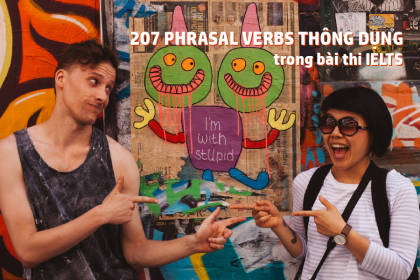Trong tiếng Anh, việc sử dụng động từ theo sau là V-ing hay to V không chỉ là một yếu tố ngữ pháp đơn thuần mà còn đóng vai trò cực kỳ quan trọng trong kỳ thi IELTS. Việc nắm vững cách sử dụng những động từ này sẽ giúp bạn diễn đạt ý kiến một cách chính xác và tự nhiên, từ đó nâng cao điểm số trong phần Speaking và Writing. Những động từ này không chỉ thể hiện khả năng ngôn ngữ mà còn giúp bạn truyền đạt cảm xúc và ý tưởng một cách mạch lạc. Hôm nay, hãy cùng JOLO khám phá các động từ nào theo sau là V-ing hay to V, để giúp bạn tự tin hơn trong hành trình chinh phục kỳ thi IELTS nhé!

1. Các động từ theo sau là V-ing
Dưới đây là một số động từ tiếng Anh theo sau bằng V-ing, cùng với ví dụ cách sử dụng:
- Enjoy (thích): She enjoys reading books in her free time.
- Like (thích): I like swimming in the ocean.
- Love (yêu thích): They love watching movies on weekends.
- Hate (ghét): He hates doing the dishes after dinner.
- Prefer (thích hơn): I prefer hiking to sitting indoors.
- Start (bắt đầu): They started working on the project yesterday.
- Begin (bắt đầu): She began learning the piano when she was five.
- Continue (tiếp tục): The rain continued falling all night.
- Finish (kết thúc): He finished cleaning the room just in time.
- Keep (tiếp tục/làm tiếp): Please keep quiet during the presentation.
- Avoid (tránh): They avoid eating fast food for health reasons.
- Admit (thừa nhận): She admitted making a mistake in her report.
- Consider (xem xét): They considered going on a vacation this summer.
- Mind (quan tâm/tâm trí): Do you mind waiting a few minutes?
- Imagine (tưởng tượng): I can't imagine living without my family.
- Regret (hối tiếc): He regrets not studying harder for the exam.
- Suggest (đề xuất): She suggested going to the beach for the weekend.
- Stop (dừng lại): They stopped talking when the teacher entered the room.
- Start (bắt đầu): The concert started at 8 PM.
- Finish (kết thúc): We finished painting the house last week.
- Consider (xem xét): She considered changing her career.
- Delay (trì hoãn): The flight was delayed due to bad weather.
- Recommend (đề nghị): The doctor recommended taking vitamins daily.
- Finish (kết thúc): They finished building the house last year.
- Keep (giữ): He keeps interrupting me during the meeting.
- Mention (đề cập): She mentioned seeing the movie last night.
- Imagine (tưởng tượng): Can you imagine living in a different country?
- Practice (tập luyện): They practice playing the piano every day.
- Postpone (hoãn lại): The event was postponed until next month.
- Risk (mạo hiểm): He risked crossing the river on foot.
- Avoid (tránh): They avoid talking about politics at family gatherings.
- Appreciate (đánh giá cao): She appreciates receiving thoughtful gifts.
- Understand (hiểu): I don't understand why he's always late.
- Regret (hối tiếc): She regretted saying those hurtful words.
- Involve (liên quan đến): The project involves working with a diverse team.
- Finish (kết thúc): He finished writing the report at midnight.
- Enjoy (thích): They enjoy traveling to new places.
- Continue (tiếp tục): The music continued playing all night.
- Keep (tiếp tục/làm tiếp): Please keep studying for your exam.
- Start (bắt đầu): They started planning their wedding months in advance.
2. Các động từ theo sau là to V
Dưới đây là một số động từ tiếng Anh theo sau bằng "to V" (infinitive form), cùng với ví dụ cách sử dụng:
- Want (muốn): She wants to learn a new language.
- Plan (kế hoạch): They plan to visit Europe next summer.
- Decide (quyết định): He decided to take a year off from work.
- Need (cần): I need to finish my homework before dinner.
- Try (thử): She's going to try to bake a cake for the first time.
- Hope (hy vọng): We hope to see you at the party.
- Agree (đồng ý): They agreed to meet at the coffee shop.
- Fail (thất bại): He failed to complete the assignment on time.
- Promise (hứa): She promised to call me when she arrives.
- Refuse (từ chối): They refused to join the project.
- Intend (dự định): I intend to start exercising regularly.
- Choose (chọn): We choose to eat dinner at the Italian restaurant.
- Expect (kỳ vọng): They expect to finish the construction by December.
- Offer (đề nghị): He offered to help with the heavy lifting.
- Hesitate (do dự): She hesitated to speak in front of the audience.
- Volunteer (tình nguyện): They volunteered to clean up the park.
- Learn (học): He wants to learn to play the guitar.
- Manage (quản lý): She managed to solve the complex math problem.
- Ask (hỏi): I need to ask him to borrow his car.
- Forget (quên): Don't forget to lock the door when you leave.
- Help (giúp đỡ): Can you help me to carry these bags?
- Refuse (từ chối): He refused to answer any more questions.
- Expect (kỳ vọng): We expect you to be on time for the meeting.
- Offer (đề nghị): She offered to pick up groceries on her way home.
- Agree (đồng ý): They agreed to compromise on the project.
- Desire (mong muốn): He desires to travel the world someday.
- Learn (học): She wants to learn to dance ballet.
- Tend (có xu hướng): Cats tend to scratch furniture if not trained.
- Choose (chọn): You have to choose to be happy in life.
- Fail (thất bại): They failed to complete the mission successfully.
- Promise (hứa): I promise to return your book by next week.
- Intend (dự định): They intend to start a new business.
- Prepare (chuẩn bị): She needs to prepare to give a speech.
- Dare (dám): Do you dare to go on the roller coaster?
- Seek (tìm kiếm): They seek to improve their skills.
- Struggle (cố gắng): He struggles to find a job in this economy.
- Learn (học): I want to learn to cook Thai cuisine.
- Plan (kế hoạch): We plan to travel the world in the future.
- Want (muốn): Do you want to come to the party with us?
- Manage (quản lý): She managed to solve the puzzle.
3. Các động từ theo sau gồm cả “to V” và “V-ing”
Dưới đây là một số động từ tiếng Anh có thể theo sau bằng cả "to V" (infinitive form) và "V-ing" (gerund form):
Begin | /bɪˈɡɪn/ | Bắt đầu | I begin reading the book at 10pm. = I begin to read the book at 10pm. (Tôi bắt đầu đọc sách lúc 10 giờ tối.) |
Continue | /kənˈtɪnjuː/ | Tiếp tục | She continued writing the report after lunch. = She continued to write the report after lunch. (Cô ấy tiếp tục viết báo cáo sau bữa trưa.) |
Hate | /heɪt/ | Ghét | I hate doing the dishes. = I hate to do the dishes. (Tôi ghét rửa chén.) |
Like | /laɪk/ | Thích | She likes swimming in the ocean. = She likes to swim in the ocean. (Cô ấy thích bơi lội trong đại dương.) |
Love | /lʌv/ | Yêu | He loves playing football with his friends. = He loves to play football with his friends. (Anh ấy yêu thích chơi bóng đá với bạn bè.) |
Prefer | /prɪˈfɜːr/ | Thích hơn | I prefer reading books to watching TV. = I prefer to read books to watching TV. (Tôi thích đọc sách hơn xem TV.) |
Start | /stɑːrt/ | Bắt đầu | They started cleaning the house early in the morning. = They started to clean the house early in the morning. (Họ bắt đầu dọn dẹp nhà từ sáng sớm.) |
Như vậy, việc nắm vững các động từ theo sau là V-ing và to V không chỉ giúp bạn cải thiện kỹ năng ngôn ngữ mà còn tạo nền tảng vững chắc cho sự thành công trong kỳ thi IELTS. Thông qua việc hiểu rõ cách sử dụng và phân biệt giữa hai cấu trúc này, bạn sẽ có thể diễn đạt ý kiến và cảm xúc một cách tự tin hơn, đồng thời nâng cao khả năng giao tiếp của mình. Hãy tiếp tục luyện tập và áp dụng những kiến thức đã học vào thực tế, và đừng quên rằng mỗi bước tiến nhỏ đều góp phần vào thành công lớn trong hành trình chinh phục tiếng Anh. Cảm ơn bạn đã đồng hành cùng JOLO, chúc bạn đạt được những kết quả tốt nhất trong kỳ thi IELTS sắp tới!
Để biết thêm chi tiết về các khóa học và tài liệu luyện thi IELTS, bạn có thể tham khảo thêm tại https://hoc-ielts.jolo.edu.vn/ hoặc liên hệ với JOLO qua hotline 093.618.7791 để được tư vấn và hỗ trợ.






















